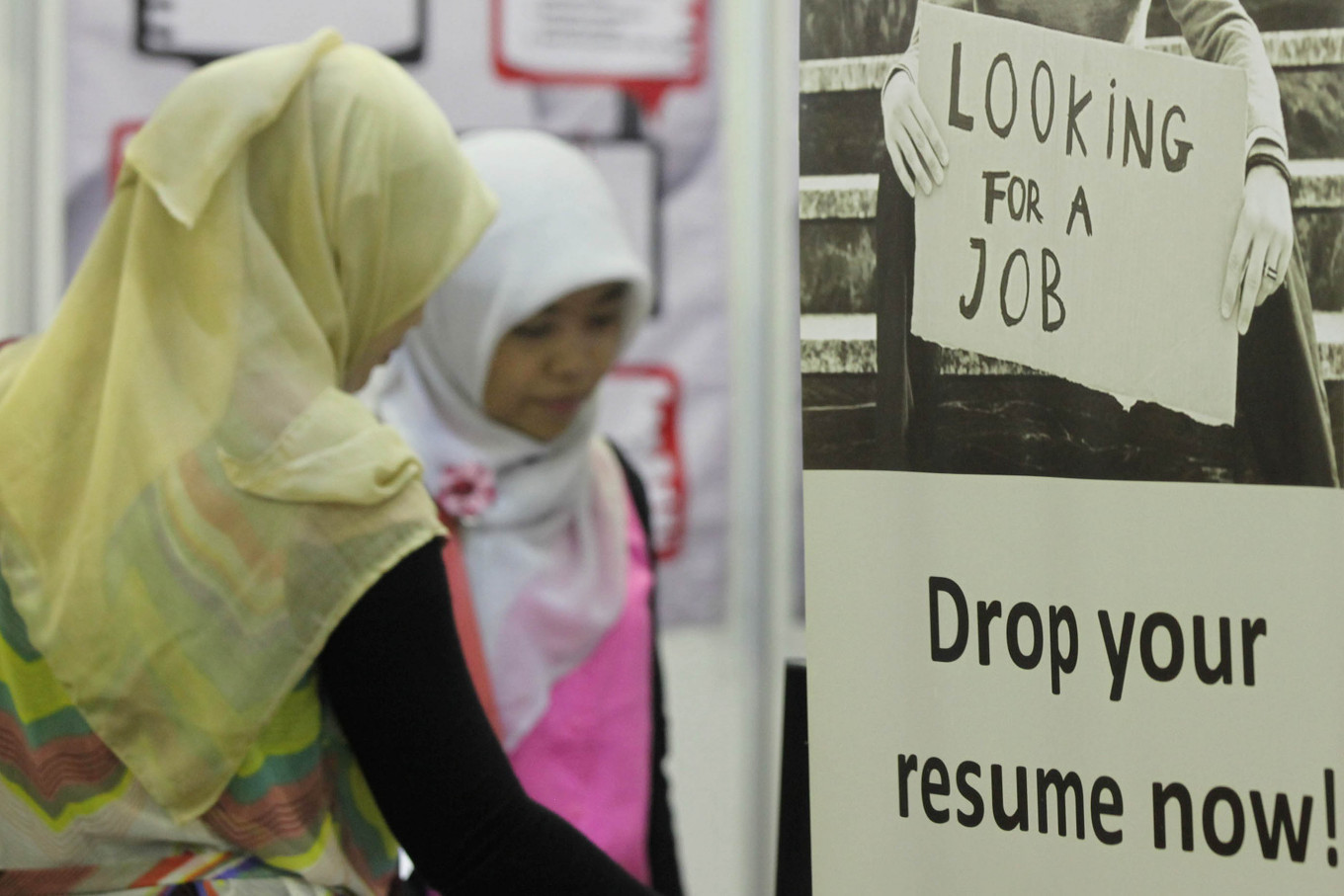Popular Reads
Top Results
Can't find what you're looking for?
View all search resultsPopular Reads
Top Results
Can't find what you're looking for?
View all search resultsIt’s official: Government, digital companies team up to launch preemployment card
About 7 million job seekers have yet to find work, the majority of which are from 18 to 24 years old and about 90 percent of them have not taken certification training.
Change text size
Gift Premium Articles
to Anyone
 Two job seekers see opportunities during a job fair in Balai Kartini, Jakarta, on Aug. 23, 2013. The government teamed up with online marketplace, e-wallet and education technology platforms to officially launch the preemployment card program on Friday amid an emergency to support a workforce hit by the adverse economic impacts of COVID-19. (JP/Nurhayati)
Two job seekers see opportunities during a job fair in Balai Kartini, Jakarta, on Aug. 23, 2013. The government teamed up with online marketplace, e-wallet and education technology platforms to officially launch the preemployment card program on Friday amid an emergency to support a workforce hit by the adverse economic impacts of COVID-19. (JP/Nurhayati)
T
he government teamed up with online marketplace, e-wallet and education technology platforms to officially launch the preemployment card program on Friday amid an emergency to support a workforce hit by the adverse economic impacts of the spreading COVID-19 coronavirus.
Coordinating Economic Minister Airlangga Hartarto said the program would allow registration in the next two weeks, adding that the online training would be available nationwide. Meanwhile, offline training sessions would be available in Riau, Bali, North Sulawesi and Surabaya during the program’s first phase of implementation.
“The card will be an alternative for those affected by the COVID-19 [outbreak] to learn new skills, upskill and reskill,” Airlangga said in Jakarta.
About 7 million job seekers have yet to find work, the majority of which are from 18 to 24 years old and about 90 percent of them have not taken certification training, according to Airlangga.
Read also: Tax breaks, job training to combat virus impacts
“The program will allow them to enhance their competence and boost their competitiveness,” he added.
The launch of the program, originally slated for April in Greater Jakarta, has been advanced three times as the government scrambles to mitigate the virus' impacts to the economy. Finance Minister Sri Mulyani Indrawati predicted the country’s economic growth would slow to between 4.5 percent and 4.9 percent in the first quarter with a possibility of plunging further in the second quarter as economic activity weakened.
Indonesia’s gross domestic product (GDP) expanded by 4.97 percent in last year’s fourth quarter, the slowest since 2016.
For the preemployment card program, the government teams up with e-commerce platforms Bukalapak and Tokopedia, state-owned Bank Negara Indonesia (BNI), e-wallet OVO and LinkAja, and edutech platforms Ruangguru, Sekolah.mu, Sisnaker, MauBelajarApa, HarukaEdu and PijarMahir, to select qualified institutions that provide the training needed by the industry.
The government is to provide from Rp 3 million (US$183.85) to Rp 7 million worth of training funds for each eligible individual that would be paid directly to the training institutions. It has allocated Rp 10 trillion this year for the program, which is expected to provide training to about 2 million people.
The preemployment card is to be available for people who are at least 18 years old by registering themselves on the program’s website, prakerja.go.id, before they pick their preferred training programs.
Read also: ‘Desperate times, desperate measures’: Calls grow for flexible state budget amid virus
The World Bank has urged Indonesia to prioritize reforms in labor resources to boost participation in the global value chains as wages in Indonesia were at half the level of China’s, but actual labor costs were as high because of low productivity.
“Indonesia’s education system is not equipping its people with adequate skills,” World Bank East Asia Pacific chief economist Aaditya Mattoo told The Jakarta Post recently.
A McKinsey & Company report entitled "Automation and the Future of Work in Indonesia" found that 23 million jobs could be displaced by automation by 2030, but 27 million to 46 million new jobs could be created in the same period if Indonesians learn new skills.
Reskilling, therefore, is key as IBM’s Institute for Business Value noted that 120 million workers from the world’s 12 largest economies, including Indonesia, may need to participate in reskilling programs in the next three years as a result of automation enabled by artificial intelligence.









